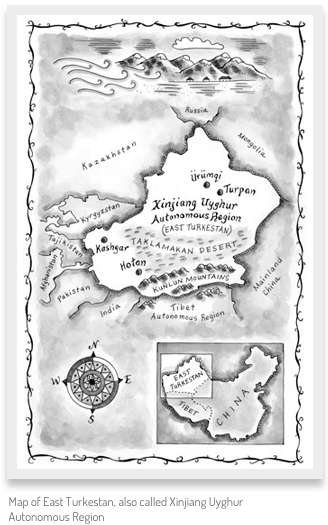About My Work
The Uyghur (pronounced WEEgur) people have a long history of living in the land they call East Turkestan. During the early centuries BCE when travelers on the Silk Road treked across the Taklamakan desert they were greeted by Uyghurs living in the oasis towns. They ate from the bounty of Uyghur farms and pastured herds, traded at the bazaars and markets, coveting the precious jade and the fine works of the silk weavers and craftsmen. They found pleasure in the Uyghur songs and dances.
A traveler today can find traces of this ancient way of life. Donkey carts still amble along dusty unpaved roads, driven by peasants carrying goods to market. Mud-brick homes offer comfort. Since the 1950s much has changed. The Uyghur population of East Turkestan has shrunk from 90% to less than half. The Han Chinese are taking over the land and the vast resources of gas, coal, oil and precious metals. The Uyghur language, their culture and their Muslim religion are under assault; many of their traditional neighborhoods have been razed. Their land is now called Xinjiang.
In The Vine Basket and Factory Girl Uyghur girls are sent away to work in far-off regions of China so that they will not marry Uyghur men and have Uyghur babies. If they refuse to go they are denied a marriage certificate, their registration cards are taken away and the family is fined an impossible sum.
Uyghurs living in China are punished for speaking out. Rebiya Kadeer and other leaders who have fled their homeland, work tirelessly for improved human rights in their homeland.
Links
Listening Library - Audio Clip - The Vine Basket
Uyghur American Association
London Uyghur Ensemble
Uyghur Cultural Orientation
World Uyghur Congress
Radio Free Asia
"An elephant can crush an ant with one footstep. But an ant inside an elephant's trunk can madden it to death."
– Uyghur saying |

